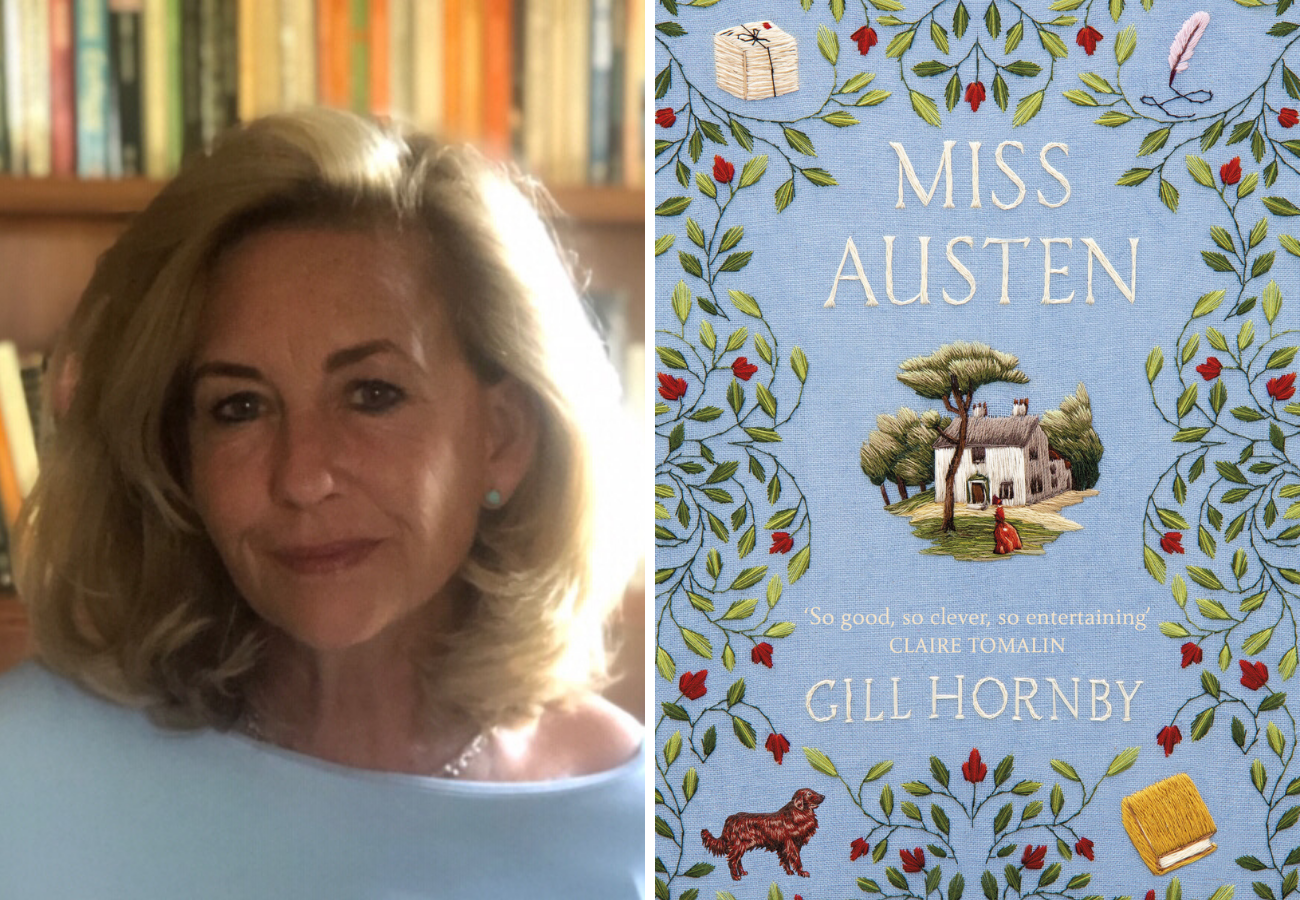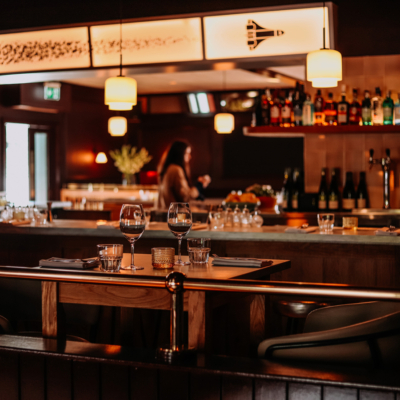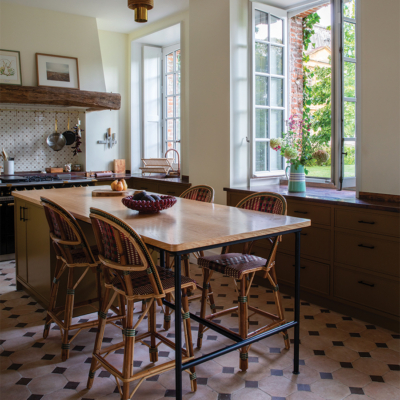Gill Hornby is a bestselling author and journalist who has published four books to date, including The Hive (2013), All Together Now (2015), and The Story of Jane Austen (2017), a biography for young readers. She was educated at Brasenose College, Oxford, and worked for many years in News and Current Affairs at the BBC. She has written book reviews, features and columns for The Times, The Guardian, The Literary Review and The Daily Telegraph.
Hornby’s new novel, Miss Austen, is a beautifully written story that explores why Cassandra Austen burned a trove of her sister Jane’s letters. What’s been perceived as a reckless act has bothered experts for centuries, but perhaps they judged her too harshly? While certainly a divisive figure, without Cassandra Austen there would have been no Emma or Pride and Prejudice. She has been credited for preserving the majority of Jane’s writings, for her commitment as the executor of her beloved sister’s estate, and for painting her likeness.
Set in 1840, an ageing Cassandra visits the Fowles family at their vicarage home in Kintbury, Berkshire. Concealed in some crevice of the building are the letters she desperately seeks – and finds. As Cassandra reminisces about her youth and her close relationship with her late sister, she faces a moral dilemma. Should she protect Jane’s reputation or let go of what would eventually become important artefacts?
Gill Hornby now lives in the very same vicarage with her husband Robert Harris. Her passion for the history of this family is immediately evident, as one becomes immersed in the world of Jane Austen and those she left behind. The author’s imagining of what the mysterious letters might have contained and Cassandra’s motivation for destroying them, is a stroke of genius. The Austenian spirit shines throughout the book, making this a must-read for every devotee.
Hornby has received positive reviews across the board, including from The Observer, which said – “Miss Austen is a novel of great kindness, often unexpectedly moving, with much to say about the status of ‘invisible’ older women. Above all, it’s concerned with the triumph of small acts of goodness; you can’t help feeling that Jane would have approved.”
The TV and film rights for Miss Austen have been optioned by Baby Cow Productions, Steve Coogan’s company.
Miss Austen (€15.99) is published by Penguin and available from all good bookshops.

On home
I live in Kintbury, West Berkshire – which also just happens to be the setting for my novel, Miss Austen – with my husband and dog. It’s what an estate agent would call “a desirable village”, and not exactly awash with music venues and spas, I’m afraid. But I’m very fond of the Corner Stores and the pub, the Dundas Arms, which is down on the canal and very pretty. We had four children over a decade, so for nearly thirty years this was an extremely noisy and busy family home, with mountain ranges of laundry and a fridge full of Babybel cheeses and unhealthy yoghurts…And now our youngest has just started university and for the first time since the 1980s we are actually on our own. To be honest, we were both dreading it. We are two writers at home, and I feared I’d fall apart without the rhythm of the school day and the school term and so on. But by God, it’s heaven! I love my children dearly, but they are all – ahem – very strong characters. It is quite nice to finish a sentence and not cater as if for an army on manoeuvres.
On roots
I grew up in Maidenhead, the other end of Berkshire, with just my mum and my brother. My father left us when I was quite small, and he took all his record collection apart from Swingin’ Safari, by Bert Kampfurt so, on high days and holidays – and every Christmas night – we would dance round the sitting room to that. Even when we were teenagers, and had our own records and the place was full of our long-haired mates, we’d still end up bopping to Bert. My mother died just before Christmas, and when the coffin left the church at the end of the service, we played Swingin’ Safari.
My dad moved abroad and started another family, and would sometimes come back and take us out for the day (though he was never allowed to cross our threshold.) He became quite well off – which we were very much not – and was always in some posh car. I used to dread these outings, and get very anxious. The smell of leather seats still makes me sick to this day.
On early reading
I can’t remember being read to, to be honest, but I did learn to read very young – probably because I wasn’t being read to – and had my nose in a book from the age of four. My mother used to drop us off at Maidenhead Library every Saturday morning while she did the shopping, and we’d always try and read one book while we were there, and then take out our full weekly quota. I adored Enid Blyton, and have no time for those snobs who say kids shouldn’t read her. I’m jolly glad my mum didn’t have such fancy ideas. The Enchanted Wood is a work of genius, and all my kids have adored The Faraway Tree. I was also lucky enough to come at the right time for the golden age of Puffin Books. The Family from One End Street, Lottie and Lisa, Stig of The Dump…All of them greatly beloved.
On family
We didn’t really have books in the house. My mum was neither a writer nor, particularly, a reader but she was very keen that we were: she did see the point of it. I don’t know how or why Nick and I grew up to be writers ourselves. It just seems to be some kind of fluke. But I do know that, growing up in a very square suburban town in the 70s, in a strange little triangle of a family, was very formative. Everyone else had two parents, and a mother who stayed at home, where mine had to go out to work. I definitely felt like an outsider, and became an observer. I was always attaching myself to my friends’ families, and studied them, rather like an undercover agent. And what I write about now is families – whether it be contemporary ones of my own creation or the Austens in the nineteenth century. Nothing interests me more. Perhaps I was already researching them, back in my childhood.
The hardest thing was creating my Jane – making her walk and talk and think out loud
On creating
Before the children left home, I was writing in an outbuilding so that I got some peace and quiet. But now the coast is clear, I’ve been promoted back to the house! I’ve taken over their old playroom. It’s next to the kitchen – very important for kettle access for my endless cups of tea – and has lovely long windows looking out over the garden, with bookcases either side. Because this is a new arrangement, the shelves are still full of the Children’s Encyclopaedia Brittanica and pop-up books and sheet music, but I will colonise them very soon. The desk is pushed into the wall at the moment, which I’ve been told is very poor feng shui but I don’t think I care much about all that. On my desk are perched framed covers of my books, the odd cartoon and I have a little clockwork Jane Austen that was in my stocking a few years ago.
As long as I know what I’m writing and I have some sort of deadline – that bit’s important; I can do nothing without a deadline – I can focus anywhere. I just put in earplugs, which not only block out the noise but also somehow turn my mind inwards so that can think properly. For a change of scene, or to release any blockage, I just have to walk the dog and then it all sorts itself out.
On independent bookshops
I love and salute all independent bookshops. They are such a pure force for good, and just to open one is an act of abandoned optimism. It’s wonderful that they are doing so well at the moment. I know it’s still a daily struggle for most of them, but to be able to keep a business going on the basis that people want to read books…That’s a great way to live your life. We are so lucky here, because, in our nearest town, we have something marvellous called Hungerford Bookshop. There always had been a bookshop, but nobody made much of a go of it. Then a young couple bought it and together have turned it into a thriving shop. And not only that. They put on loads of events, authors come out here from all over the place every week, and it has built up the community in a way that no other shop possibly could. It provides cultural access to a quite rural area. I wish I’d had some equivalent when I was growing up.
On her “To Be Read” pile
I’m re-reading Middlemarch. We had the last paragraph as one of the readings at my mother’s funeral – she was a very good, community-minded person and a great one for “unhistoric acts” – and I realised that I had only read it when I was young and too daft to get most of it. Already I’m getting so much more out of it than I did the last time. I’ve also got a slim novel by Noel Streatfeild on the go. She was another favourite when I was a child, and I was delighted to find, recently, that she wrote for adults. She’s fab. This one is called I Ordered a Table for Six, and is about a woman doing charity work in London during the Blitz…Just up my street. And my husband has just been sent the new Anne Enright, Actress, so I’ve nabbed that. Enright is brilliant on families – I adored The Green Road – so can’t wait to get cracking on it.
On Miss Austen
27 years ago, we moved into our house, and I was told of the Jane Austen connection: that her sister, Cassandra, had once been engaged to the second son of the vicar here, that it had been considered the most perfect match. And that tragedy struck, and poor Cassy never married. She started to haunt me. Then I was commissioned to write a biography of Jane for younger readers. I learned more about Cassandra, and the closeness of the two sisters. I also learned that, just before her death, Cassandra had burned so many of Jane’s letters. At once, I knew that I wanted to write a novel about that – what exactly was it that Cassandra wanted to hide? – but it took me a long time to get up the courage to do so. The hardest thing was creating my Jane – making her walk and talk and think out loud – and, on top of that, inventing so many of her missing letters. It seemed so impudent, I couldn’t get over it. But once I finally got going – and I did keep putting it off – I then couldn’t shut her up. From then on, the whole process was a joy.
On Jane Austen
She’s so timeless for exactly the same reasons that she is so often criticised: Austen novels barely refer to the big political events, the war with the French, reform or enclosure. She wrote about mothers and lovers and embarrassing relatives and what’s going on with the neighbours: all of which still bother us today.
On what’s next
More Austens, I hope. If I’m lucky…If you like writing about family, there is no better or more interesting family to work with. There are so many of them, they’re all so lively and interesting and had such varied fortunes. I could bury myself in there forever.
LOVETHEGLOSS.IE?
Sign up to our MAILING LIST now for a roundup of the latest fashion, beauty, interiors and entertaining news from THE GLOSS MAGAZINE’s daily dispatches.









